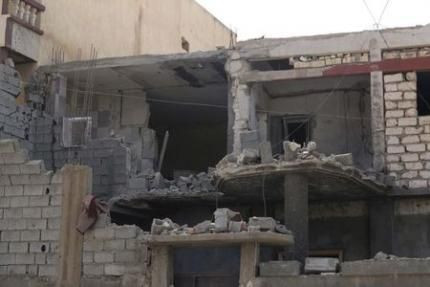Heavy Shelling Resumes In Libyan Capital Tripoli

TRIPOLI (Reuters) - Heavy shelling resumed in the Libyan capital Tripoli on Sunday after three days of relative calm following more than a month of street fighting between rival armed factions battling for control of the city's airport.
The North African OPEC oil producer is facing the worst violence since the 2011 war that toppled Muammar Gadhafi, with more than 200 people killed. Many Western embassies and international companies have evacuated staff members.
Southern Tripoli was covered by black plumes of smoke, with artillery and rockets hitting areas around the international airport, where two rival brigades of ex-rebels have established front lines.
There were no immediate reports of casualties from the new exchanges. But the health ministry said it cannot reach hospitals because of power failures and gasoline shortages in Tripoli.
"We have been trying to gather information and details, but it is really hard to reach doctors," health ministry spokesman Ammar Mohammed said.
A United Nations delegation has been in Tripoli since Friday to try to broker a cease-fire between armed factions loyal to Islamist-allied Misrata brigades and their rivals allied to the western town of Zintan.
An official from the delegation, who declined to be identified, said on Saturday that U.N. envoys were optimistic.
"The mission has already met several key actors and is still fairly optimistic that a cease-fire can be obtained," the official said.
"The delegation is very concerned about the humanitarian consequences of the ongoing crisis if a cease-fire is not achieved very quickly," he added.
PARLIAMENT
Libya's newly elected parliament has also called for an immediate cease-fire, but the main Islamist political party and its allies have opposed the fact that parliament has been meeting in the eastern town of Tobruk, which they described as unconstitutional.
"We recognize the parliament, but we don't recognize its sessions in the town ofTobruk and all the decisions that come from there," Ahmed Hadil, a spokesman of the Central Shield brigades, one of the militias fighting to control the airport, told reporters on Saturday.
Since the fall of Gadhafi, Libya's government has been unable to control rival militias of heavily armed former rebels, who once fought against Gadhafi but now refuse to disarm and count on semi-official support from ministries or politicians.
Fighting since last month over the Tripoli airport involves two loose factions.
On one side are Zintanis, including some former Gadhafi forces, who present themselves as a bastion against Islamist fundamentalists and the Muslim Brotherhood.
Against them are brigades from the western port of Misrata, allied with Islamist political forces and other militias, who say they are fighting to clear out remnants of Gadhafi's army.
In Benghazi, only sporadic gunfire has broken the calm that has prevailed since a coalition of fighters called the Benghazi Revolutionaries Shura Council overran the main military base in the city 10 days ago.
The Shura Council is an alliance between a group of former rebels and militants from Ansar al-Sharia, which Washington blames for killing its ambassador in 2012 and classifies as a terrorist organization.
South Korea groups Hyundai and Doosan have suspended construction of a 1,400 megawatt Libyan power plant in the town of Sirte because of security concerns, the plant managing director and a town council spokesman said on Sunday.
© Copyright Thomson Reuters 2024. All rights reserved.




















